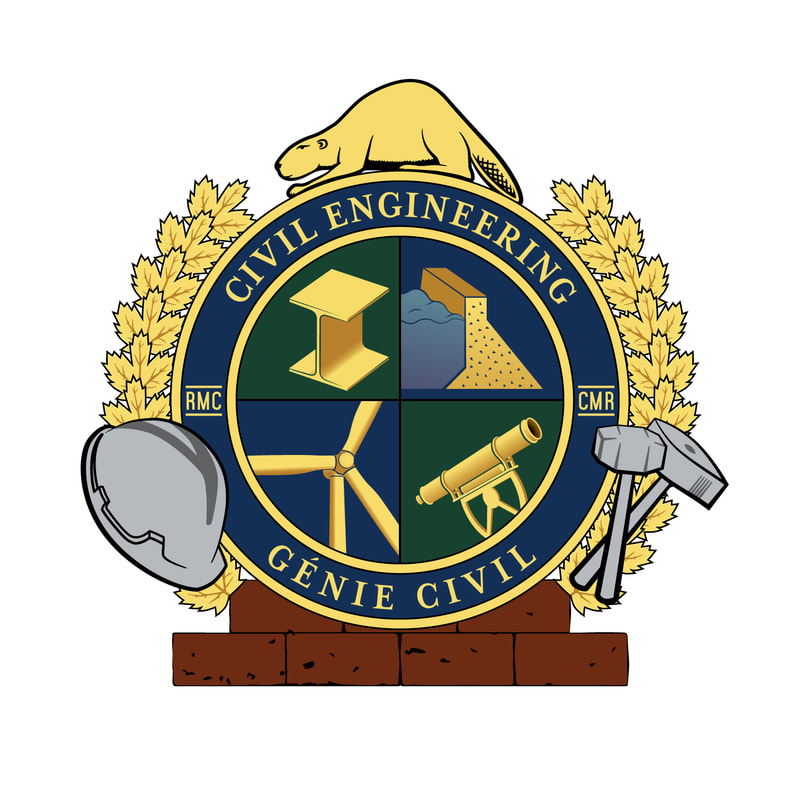Teaching Philosophy
Personal and Professional Mission Statement – To engage my students’ minds with regards to Professional, Military and Engineering matters by providing high quality, current, technologically-enhanced instruction with a view to encouraging them to buy into the value of their education. This is accomplished (hopefully) through leading by example, taking a hands-on approach to education & personal growth while balancing the aims of accreditation, student learning and the vision of RMC, the Canadian Armed Forces and the Department of National Defence.
The development of an RMC graduate is supported primarily by four distinct pillars: Academic, Military, Athletics and Bilingualism. As such, my continuous involvement in student-oriented initiatives related to these four areas is paramount. I believe that a university degree encompasses more than classroom calculations and that the students must be exposed to and shown the relevance of their degree as much as possible. Being a Professional Engineer, I also believe in another major pillar entitled Professionalism.
Contributions to Teaching Pedagogy. My teaching philosophy is outcomes based as it aims to set the right conditions for a successful career (military or industry) for each and every one of my students. My teaching design stems from an in-depth understanding of my students’ unique needs as Officer Cadets and future engineering professionals. I use lessons learned from my experiences as a Military Engineering Officer and practicing Professional Engineer with a view to engaging the students’ interest in problem solving activities and critical analysis associated with engineering design. My lesson plans incorporate a variety of technology-enhanced methods (use of learning management systems such as Moodle, on-line tutorials and resources etc.), student-led seminars and hands-on laboratories and field exercises. Ongoing opportunities inside and outside of the classroom are also offered to the students in order to improve and develop their communication and teamwork skills. The results, I must say have been encouraging. Based on my keen interest in education, I have also published on Engineering Education and have presented selected components of state-of-the-art teaching technologies that have been applied in my lectures. My suite of student learning assessment tools includes use of Rubrics for evaluating student presentations, written engineering reports, and teamwork in field exercises.
Personal and Professional Mission Statement – To engage my students’ minds with regards to Professional, Military and Engineering matters by providing high quality, current, technologically-enhanced instruction with a view to encouraging them to buy into the value of their education. This is accomplished (hopefully) through leading by example, taking a hands-on approach to education & personal growth while balancing the aims of accreditation, student learning and the vision of RMC, the Canadian Armed Forces and the Department of National Defence.
The development of an RMC graduate is supported primarily by four distinct pillars: Academic, Military, Athletics and Bilingualism. As such, my continuous involvement in student-oriented initiatives related to these four areas is paramount. I believe that a university degree encompasses more than classroom calculations and that the students must be exposed to and shown the relevance of their degree as much as possible. Being a Professional Engineer, I also believe in another major pillar entitled Professionalism.
Contributions to Teaching Pedagogy. My teaching philosophy is outcomes based as it aims to set the right conditions for a successful career (military or industry) for each and every one of my students. My teaching design stems from an in-depth understanding of my students’ unique needs as Officer Cadets and future engineering professionals. I use lessons learned from my experiences as a Military Engineering Officer and practicing Professional Engineer with a view to engaging the students’ interest in problem solving activities and critical analysis associated with engineering design. My lesson plans incorporate a variety of technology-enhanced methods (use of learning management systems such as Moodle, on-line tutorials and resources etc.), student-led seminars and hands-on laboratories and field exercises. Ongoing opportunities inside and outside of the classroom are also offered to the students in order to improve and develop their communication and teamwork skills. The results, I must say have been encouraging. Based on my keen interest in education, I have also published on Engineering Education and have presented selected components of state-of-the-art teaching technologies that have been applied in my lectures. My suite of student learning assessment tools includes use of Rubrics for evaluating student presentations, written engineering reports, and teamwork in field exercises.
Click on Buttons for Student Articles and Testimonials:
Graduate
2013- CE521 - Instrumentation & Monitoring: Planning, Execution, Measurement and Data
Analysis in Geotechnical and Environmental Engineering
2013 CIVL 895 (Queen’s) – Special Topics in Civil Engineering
2013 GEOL 803 (Queen’s) – Design and Construction of Underground Works
2009- GEOL 873 (Queen’s) – Advanced Numerical Modelling for Tunnelling within
Weak Rock Masses (components of)
2009- GEOL-840 (Queen’s) - Special Topics in Geology and Geological Engineering
2009 GEOL-843 (Queen’s) - Problems in Geological Engineering . Investigations of
selected geological engineering problems
2013- CE521 - Instrumentation & Monitoring: Planning, Execution, Measurement and Data
Analysis in Geotechnical and Environmental Engineering
2013 CIVL 895 (Queen’s) – Special Topics in Civil Engineering
2013 GEOL 803 (Queen’s) – Design and Construction of Underground Works
2009- GEOL 873 (Queen’s) – Advanced Numerical Modelling for Tunnelling within
Weak Rock Masses (components of)
2009- GEOL-840 (Queen’s) - Special Topics in Geology and Geological Engineering
2009 GEOL-843 (Queen’s) - Problems in Geological Engineering . Investigations of
selected geological engineering problems





